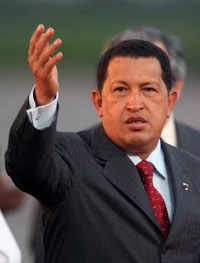Colombia cancels Chavez mediation role in hostage swap
Columbia’s government cancelled Venezuelan President Hugo Chavez's intermediary role with the rebels in possible hostage exchange, striking a blow to the efforts to free three kidnapped U.S. contractors and a former presidential candidate.

The decision came after the Venezuelan leader, who began mediating an exchange in August with President Alvaro Uribe's permission, spoke to Colombia's army chief in defiance of an order not to talk directly to military leaders on the issue, said presidential spokesman Cesar Mauricio Velasquez.
Chavez spoke by telephone with Gen. Mario Montoya earlier Wednesday about the state of hostages held by the Revolutionary Armed Forces of Colombia, or FARC, Velasquez said late Wednesday in a hastily convened press conference.
Velasquez said the leftist Colombian senator serving as a go-between in the talks, Piedad Cordoba, phoned Montoya and passed the telephone to Chavez. Cordoba's mediation role was also being canceled, he added.
Velasquez did not say why Uribe demanded Chavez not speak to Colombian military officials.
The FARC, Latin America's most potent rebel army, holds some 45 high-value hostages, including three U.S. military contractors and Ingrid Betancourt, a former presidential candidate who is a dual Colombian-French national and has become a cause celebre in France following her nearly six years in captivity.
For their release, the FARC is demanding the government release all imprisoned rebels, who number in the hundreds.
Families of the kidnapped had supported Chavez's intervention, saying any deal to be made was "now or never."
The decision to end Chavez's mediation is likely to prove a severe setback for any talks between the rebels and Colombia's president, who share a strong mutual dislike. Uribe's father was killed by FARC rebels nearly two decades ago. The conservative president, in turn, has tenaciously attempted to defeat the guerrilla army with a U.S.-backed military buildup.
Chavez had already hosted a top FARC leader in the Venezuelan capital of Caracas on Nov. 8.
But the FARC has so far failed to produce proof-of-life for any of the high-value hostages, as sought by the Colombian and U.S. governments.
At a military ceremony in Bogota earlier Wednesday, U.S. Ambassador William Brownfield said in response to reporters' questions about the hostages that Washington is disappointed the recent diplomacy has yielded few results.
"There's been no proof of life," Brownfield said. "Nothing."
The decision by Colombia's government follows a series of Chavez statements that clearly annoyed Uribe.
On Monday, Chavez said Uribe had told him he was prepared to meet with the aging leader of the FARC, Manuel "Sureshot" Marulanda. In response, Uribe said those comments were made in confidence and placed a Dec. 31 time limit on Chavez's mediation efforts.
As late as Wednesday afternoon, however, Colombian government officials were praising the mediation role of Venezuela's socialist leader.
"Chavez is playing an excellent role and for that we are grateful," said Luis Carlos Restrepo, the government's chief peace negotiator.
Earlier in the week, Chavez met with French President Nicolas Sarkozy in Paris to discuss Betancourt's situation.
Betancourt's family want proof she is still alive. In France, Chavez said that Marulanda, the FARC commander, wrote to him promising to furnish that proof "by the end of the year."
The American hostages are Northrop Grumman Corp. employees Keith Stansell, Marc Gonsalves and Tom Howes, who were taken by the FARC in February 2003 after their small plane crashed in the jungle while on a surveillance mission.
Subscribe to Pravda.Ru Telegram channel, Facebook, RSS!


